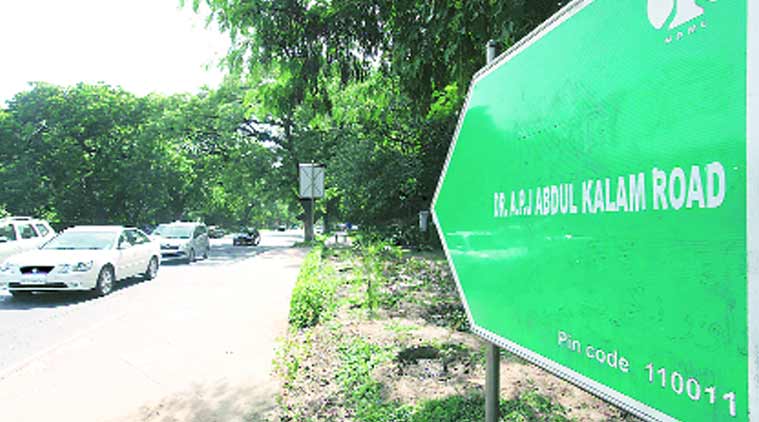Opinion Reverse swing: Road rage
Commentators on the subject have mocked him as conforming to the Hindu nationalists’ idea of a “good Muslim”.

 Delhi wakes up Friday to Dr APJ Abdul Kalam Road. Express
Delhi wakes up Friday to Dr APJ Abdul Kalam Road. Express
The wonder isn’t that Aurangzeb Road has been renamed, but that it has taken so long to rename it. It isn’t surprising in the slightest, on the other hand, that there’s been such hysterical opposition to the renaming; for to be liberal in India is to regard anything “Indian Muslim” as beyond the reach of criticism. And in reacting to the change, the late president Abdul Kalam’s name — which will replace the bloodthirsty Mughal’s on signboards and letterheads — has been besmirched by those who see him as a Muslim “Uncle Tom”, all because he played the veena and had a keen interest in Hindu scripture.
Commentators on the subject have mocked him as conforming to the Hindu nationalists’ idea of a “good Muslim”. Welcome to India, where (largely Hindu) liberals spring to the defence of a Muslim man whose imperial mission was to subjugate the country’s Hindus, while pooh-poohing a Muslim man who saw nothing wrong with embracing the ideas and values of his Hindu compatriots.
The ousting of proper nouns from public spaces isn’t new to India. The renaming of states and cities is a national pastime, in which Indians blend political posturing with half-digested history and transliterative revisionism. So Orissa becomes Odisha and Calcutta Kolkata, at the more harmless end of the scale (which doesn’t mean that the change isn’t a species of political theatrics); and Bombay becomes Mumbai and Madras Chennai, at the more intellectually warped end, where the imperatives of an imagined history crowd out recorded fact. From Bom Bahia to Mumba Devi, yeh hai Bambai meri jaan.
To be sure, mature societies do not resort to frequent changes of place — and road — names to suit shifting political fashion. There’s no doubt that this sort of thing is a feature of insecure postcolonial countries. Some change is understandable: in the first flush of Independence, India replaced a number of Anglonyms with Indian ones. These were names to which no Indian could object, such as Lajpat Rai and Kasturba Gandhi, people who fought for freedom. It was only fitting that they be honoured in civic cartography.
Other name-changes reflect a very partisan Indian disease: the bestowing upon roads (and buildings and stadiums) of the names of political apparatchiks. A prime example of this is Rajesh Pilot Lane, the case for whose renaming is no less compelling than that for Aurangzeb Road. (Ironically, Pilot Lane is but a stone’s throw from the newly christened — if that’s the right word — Kalam Road.)
Aurangzeb was an emperor whose legacy has been described as “mixed” by some historians, and not merely by liberal apologists. He wasn’t uniformly bad, they say. There are instances of kindness to Hindus in his reign. Perhaps. But the issue isn’t an actuarial one, where we stack up the credit side against the debit, and arrive at a bloodless conclusion.
Generations of Indians have believed that Aurangzeb was a cruel despot, disproportionately harsh on Hindus, and no one can argue that this belief is wrongheaded or inaccurate. You might argue — going down the route of a reductio ad absurdum — that Indians ought to rename Ashok Marg, given how nasty Emperor Ashoka was to the poor folks of Kalinga. But that hurt is dead: it died thousands of years ago. If it were alive to even the slightest extent, one can be sure that the people of Orissa — sorry, Odisha — would be clamouring for it to be renamed after a distinguished Mahapatra or Mohanty.
Rightly or wrongly, Aurangzeb still rankles with large sections of modern India — and not all of those are Hindu. And it is not an irrational rankling. Sometimes, popular sentiment must be given its due, not dismissed with an elegant wave of an elitist wrist. There is no “live” objection to Akbar or Shah Jahan, nor even to Tughlaq (whose dynastic road is also close to Kalam/Aurangzeb).
A righteous road rage has now been assuaged. Those who object can stick with the old name in their conversations and op-eds. After all, people still say Connaught Place. But for thousands of Indians, Kalam Road is the path they wish to take. It is their history, after all.
Tunku Varadarajan is the Virginia Hobbs Carpenter Fellow at Stanford University’s Hoover Institution.
@tunkuv


